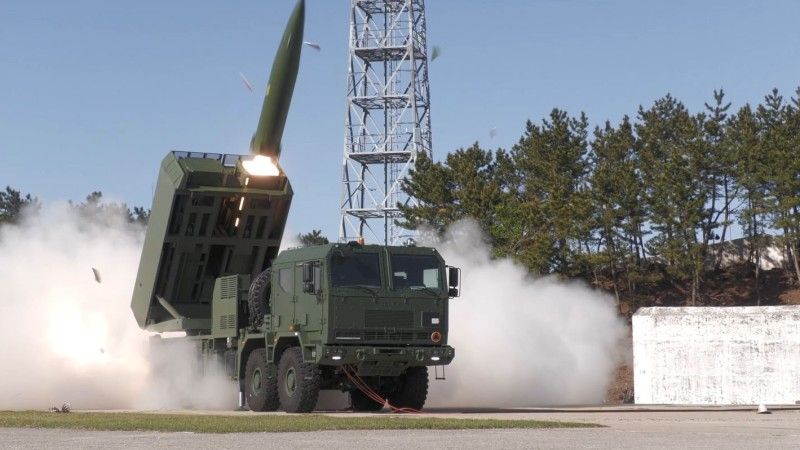Industry
Poland Signs Contract to Procure More Homar-K Systems

Photo. : Gugbang Ilbo / Movie clip screenshot
Paweł Bejda, Deputy Minister of Defence, announced that a performance contract was signed, concerning another 72 Homar-K MLRS systems for the Polish Armed Forces. On 24th April, the first CTM-290 SRBM was launched from a Polish launcher, at the Anheung range in South Korea.
This happened during the visit paid by the Polish officials to South Korea, led by Paweł Bejda, Secretary of State at the Polish Ministry of Defence. The talks are to cover the acquisition of Legwan ATVs (Kia KLTV), K9 Thunder self-propelled gun-howitzers, K2 Black Panther main battle tanks, and light FA-50 Fighting Eagle combat aircraft, to secure the requirements expressed by the Polish Armed Forces.
Today it was announced that another performance contract worth KRW 2.27 trillion (USD 1.6 bn.), covering the procurement of 72 Homar-K MLRS, exceeding 218 already procured systems (which happened in late 2022). The deliveries are planned to happen between 2026 and 2029. It is also expected that Homar-K would be integrated with the Polish 122 mm unguided rocket munitions, housed in transport/launch containers developed by WZL-2. Several thousand guided rockets (with no munitions type specified), and training and logistics packages are also a part of this procurement.
Podczas wizyty delegacji polskiej w Korei została podpisana umowa wykonawcza na dostarczenie 72 modułów wyrzutni HOMAR-K oraz kilku tys. kierowanych pocisków rakietowych. Pozyskane technologie pozwolą na wykorzystanie 122 mm amunicji rakietowej produkowanej w polskim przemyśle. pic.twitter.com/M9C1jDmh2w
— Paweł Bejda (@pawelbejda) April 25, 2024
The second performance contract envisages that maintenance facilities would be established for the launchers in Poland, and that spares for the launchers would be manufactured by the Polish industry. The first dozen modules would be delivered by the Changwon Hanwha Aerospace facility. Starting from the 13th example, further launchers will be manufactured in Poland, probably at HSW. Talks are underway regarding the license, technologies, and know-how transfer required to launch domestic manufacturing of the 239 mm CGR-080 rockets. However, this matter is discussed in a separate negotiation. Transfer of this expertise would happen once another performance contract involving Hanwha Aerospace is signed.
We are referring to a release issued by the Polish Ministry of Defence, regarding the conclusion of the second performance contract.
The agreement signed will have a major impact on the development of the Polish defence industry's potential. The acquired technologies will make it possible to establish manufacturing, maintenance, and upgrades capacity, and also to manufacture spares for the procured launchers. At the same time, within the framework of the acquired technologies, the Polish industry will acquire the ability to manufacture transport/launch containers making it possible to employ 122 mm rockets manufactured at Mesko S.A. in the launchers. Mesko S.A. is a part of the PGZ Group.
Release issued by the Polish MoD
CTM-290 SRBM launch from a Homar-K launcher was recorded by Gugbang Ilbo, the press organ of the ROK Armed Forces. The launch took place at 4 PM local time (9 AM in Poland). The missile flew for 200 seconds and hit the target. To clarify things, we should note that CTM-290 is an export variant of the KTSSM which is a Korean counterpart of MGM-140 ATACMS. In some sources, the missile is given the name Ure (Korean for Thunder). 607 mm missile is 4 meters long and weighs around 1.5 tonnes, with a warhead weighing 500 kilograms. It uses a combined INS/GPS guidance system. The first public launch of the latest KTSSM Block-II (Ure-II) variant from the K239 Chunmoo launcher took place in December 2022.
The ballistic Homar-K test took place at the Anheung range managed by the Korean ADD body, on the Western coast of the Republic of Korea. This is a relevant milestone for the Polish Rocket and Tube Artillery elements. Since September 2005, when the 7th Tactical Missile Squadron has been disbanded, the Polish Armed Forces have no tactical SRBMs in their arsenal. The end of lifecycles and the shortage of spares for four 9K79 Tochka launchers procured in the late 1980s were the reasons for that. The last launch of a Polish Tochka missile took place in May 1999, almost 25 years ago.
Meanwhile, ATACMS missiles have proven their worth in Ukraine, being used to attack Russian airfields and other critical targets, deep behind the enemy lines. Even the obsolete Tochka-U systems have proven to be useful in that conflict. We shall hope the Polish Ministry of Defence would sign agreements with Hanwha Aerospace, covering adequate procurement of such weapons, featuring a broad spectrum of warheads (HE, thermobaric, cluster), should they be available.

Photo. Mako51 / Wikimedia Commons / CC BY-SA 4.0
Homar-K is a Polish MLRS. Huta Stalowa Wola is the prime integrator in this project. 8x8 Jelcz P882.57 is the base platform - it also features an armoured cabin. In the future, it is expected that the launchers to be based on the new P883.57 trucks. Both base platforms utilize an MTU diesel engine (578 HP), coupled with a ZF automatic gearbox. Homar-K has been fitted with Fonet digital communications system, and WB Electronics Topaz integrated fire control suite.
The armament module comes in the form of a modified South Korean Hanwha Aerospace K239 Chunmoo rocket launcher. To meet the requirements defined by the Polish Armed Forces, several thousand rockets and missileswere ordered, coming in two types - 239 mm guided rockets CGR-080 with a range of 80 kilometres, and CTM-290 ballistic missiles, capable of hitting targets at a distance 290 kilometres away. Each of the launch/transport containers can accommodate up to 6 CGR-080 rockets, or a single CTM-290 missile. Furthermore, South Korea is also engaged in an R&D effort on a new missile with a range of 160 kilometres, with the manufacturing expected to be launched in 2027.
In October 2022 Poland and Korea signed a framework agreement, on the delivery of 290 Homar-K systems for the Polish Armed Forces. The first contract included the procurement of 218 launchers (plus extra equipment), several thousand rockets (two types), and logistics and training packages. The conclusion of the second performance contract means, that the possibility of procurement of all launchers envisaged by the framework agreement has been used.
